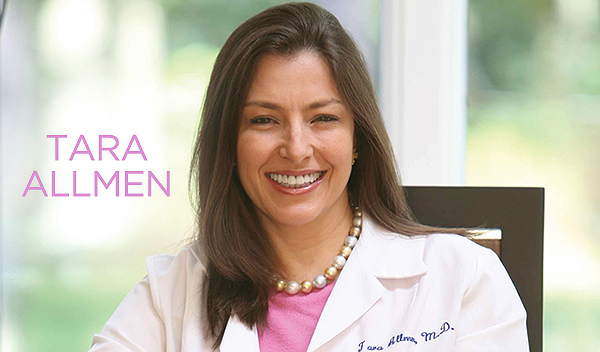Dr. Tara Allmen is a “51-year-old girl” who realized she “really had a passion for midlife women’s health, for the above 40 crowd,” when she was a practicing obgyn in her early 30s.
I think I delivered about a million babies at that point, and while I loved the practice of obstetrics (the care of reproductive aged women), there was something very special for me about taking care of women after their reproductive period was over. I felt a passion and a mission to start educating women, because once you’re done making babies you’re sort of tossed aside for the next group of women coming up the pike, and nobody educates you about what’s next for you.

“So I left my very busy obstetrics practice and joined the Center for Menopause, Hormonal Disorders and Women’s Health in NYC in 1999. I had yet to make babies of my own, but I was passionate about this group of women. I see women from 40 until death do us part. That is my group. I was a trailblazer, way ahead of my time.”
Since joining the Center for Menopause, Dr. Allmen has been devoted to helping patients, and educating medical professionals around the country on perimenopause and menopausal medicine. She established The Allmen Foundation in 2006, a non-profit organization Foundation which supports women’s health endeavors. The North American Menopause Society refers to her as a “visionary” contributor.
Dr. Allmen earned her bachelor’s degree from Johns Hopkins University, her medical degree from the State University of New York at Stony Brook, and completed a residency in obstetrics and gynecology at the University of California, San Francisco.
What interests you about this group of women?
 It’s a very interesting group, when women are faced with chronic health issues they’re not prepared for, especially in light of the fact that they’re no longer making estrogen. Things begin to change for women when we start to go on our hormonally erratic journey, which is called perimenopause. This the journey up to menopause, when our ovaries retire. So it’s the journey towards ovarian retirement.
It’s a very interesting group, when women are faced with chronic health issues they’re not prepared for, especially in light of the fact that they’re no longer making estrogen. Things begin to change for women when we start to go on our hormonally erratic journey, which is called perimenopause. This the journey up to menopause, when our ovaries retire. So it’s the journey towards ovarian retirement.
The perimenopausal journey starts in our 40s, and it is marked by irregular menstrual cycles, the easiest thing for women to notice, and is most certainly followed by many of the same symptoms that menopausal women experience, including flashes, sweats, mood changes, brain fog, irritability, sexual dysfunction, poor sleep, feeling lousy overall, no motivation to eat correctly or exercise. The perimenopausal girl needs to get a lot of extra time from her doctor. It’s the perfect opportunity to start educating women about the bigger picture of heart health, cognitive health, bone health. Most women in their 40s have to start looking at their own health choices.
 I became motivated when I’d see a lot of women after they gave birth, who started to gain weight, were fatigued, felt lousy, and didn’t have any real good information about what to do next.
I became motivated when I’d see a lot of women after they gave birth, who started to gain weight, were fatigued, felt lousy, and didn’t have any real good information about what to do next.
When you’re done making babies you need to graduate from the OB office and go on the next journey. You need to find a gynecologist who focuses on midlife women’s health. There’s not enough info to help women feel safe and comfortable when they’re transitioning in their 40s and 50s.

